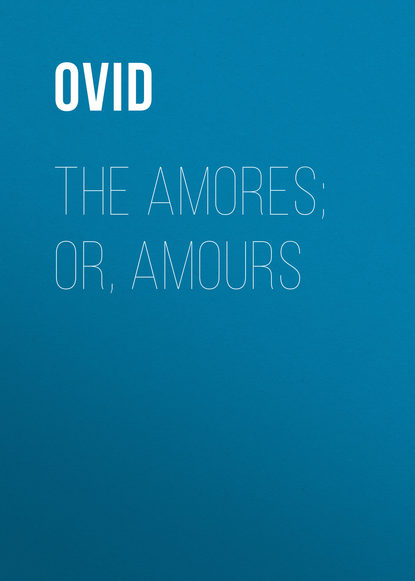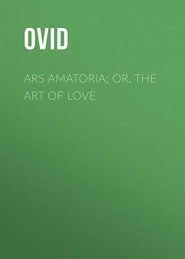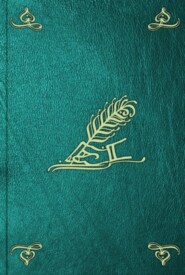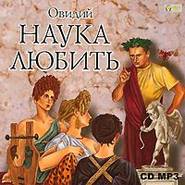По всем вопросам обращайтесь на: info@litportal.ru
(©) 2003-2024.
✖
The Amores; or, Amours
Настройки чтения
Размер шрифта
Высота строк
Поля
rpora? num misero carmen et herba nocent?
Sagave Puniceâ defixit nomina cerâ,
Et medium tenues in jecur egit acus?
Carmine læsa Ceres sterüem vanescit in herbam:
Deficiunt læsæ carmine fontis aquæ:
Ilicibus glandes, cantataque vitibus uva
Decidit; et nullo poma movente fluunt.
Quid vetat et nervos magicas torpere per arteg
Forsitan impatiens sit latus inde meum.
Hue pudor accessit: facti pudor ipse nocebat
Ille fuit vitii causa secunda mei.
At qualem vidi tantum tetigique puellam,
Sic etiam tunicâ tangitur ipsa sua.
Illius ad tactum Pylius juvenescere possit,
Tithonusque annis fortior esse suis.
Hæc mihi contigerat; scd vir non contigit illi.
Quas nunc concipiam per nova vota preces?
Credo etiam magnos, quo sum tam turpiter usus,
Muneris oblati pcenituisse Deos.
Optabam certe recipi; sum nempe receptus:
Oscula ferre; tuii: proximus esse; fui.
Quo mihi fortunæ tantum? quo régna sine usu?
Quid, nisi possedi dives avarus opes?
Sic aret mediis taciti vulgator in undis;
Pomaque, quæ nullo tempore tangat, habet.
A tenerâ quisquam sic surgit mane puellâ,
Protinus ut sanctos possit adiré Deos.
Sed non blanda, puto, non optima perdidit in me
Oscula, non omni sohcitavit ope.
Ilia graves potuit quercus, adamantaque durum,
Surdaque blanditiis saxa movere suis.
Digna movere fuit certe vivosque virosque;
Sed neque turn vixi, nec vir, ut ante, fui.
Quid juvet, ad surdas si cantet Phemius aures?
Quid miserum Thamyran picta tabeba juvet?
At quæ non tacitâ formavi gaudia mente!
Quos ego non finxi disposuique modos!
Nostra tamen jacuere, velut præmortua, membra
Turpiter, hesternâ languidiora rosâ.
Quæ nunc ecce rigent intempestiva, valentque;
Nunc opus exposcunt, mihtiamque suam.
Quin istic pudibunda jaces, pars pessima nostri?
Sic sum polhcitis captus et ante tuis.
Tu dominam falbs; per te deprensus inermis
Tristia cum magno damna pudore tub.
Hanc etiam non est mea dedignata puella
Molbter admotâ sobcitare manu.
Sed postquam nullas consurgere posse per artes,
Immemoremque sui procubuisse videt;
Quid me ludis? ait; quis te, male sane, jubebat
Invxtum nostro ponere membra toro?
Aut te trajectis Ææa venefica lanis
Devovet, aut abo lassus amore venis.
Nec mora; desiluit tunicâ velata recinctâ:
Et decuit nudos proripuisse pedes.
Neve suæ possent intactam scire ministrae,
Dedecus hoc sumtâ dissimulavit aquâ.
ELEGY VIII
And does any one still venerate the liberal arts, or suppose that soft verses have any merit? Genius once was more precious than gold; but now, to be possessed of nought is the height of ignorance. After my poems 591 (#x9_x_9_i306) have proved very pleasing to my mistress, it is not allowed me to go where it has been allowed my books. When she has much bepraised me, her door is shut on him who is praised; talented though I be, I disgracefully wander up and down.
Behold! a Knight gorged with blood, lately enriched, his wealth acquired 592 (#x9_x_9_i309) through his wounds, 593 (#x9_x_9_i312) is preferred before myself. And can you, my life, enfold him in your charming arms? Can you, my life, rush into his embrace? If you know it not, that head used to wear a helmet; that side which is so at your service, was girded with a sword. That left hand, which thus late 594 (#x9_x_9_i315) the golden ring so badly suits, used to bear the shield; touch his right, it has been stained with blood. And can you touch that right hand, by which some person has met his death? Alas! where is that tenderness of heart of yours? Look at his scars, the traces of his former fights; whatever he possesses, by that body was it acquired. 595 (#x9_x_9_i318) Perhaps, too, he will tell how often he has stabbed a man; covetous one, will you touch the hand that confesses this? I, unstained, the priest of the Muses and of Phoebus, am he who is singing his bootless song before your obdurate doors.
Learn, you who are wise, not what we idlers know, but how to follow the anxious troops, and the ruthless camp; instead of good verses hold sway over 596 (#x9_x_9_i321) the first rank; through this, Homer, hadst thou wished it, she might have proved kind to thee. Jupiter, well aware that nothing is more potent than gold, was himself the reward of the ravished damsel. 597 (#x9_x_9_i324) So long as the bribe was wanting, the father was obdurate, she herself prudish, the door-posts bound with brass, the tower made of iron; but after the knowing seducer resorted to presents, 598 (#x9_x_9_i327) she herself opened her lap; and, requested to surrender, she did surrender.
But when the aged Saturn held the realms of the heavens, the ground kept all money deep in its recesses. To the shades below had he removed brass and silver, and, together with gold, the weight of iron; and no ingots were there in those times. But she used to give what was better, corn without the crooked plough-share, apples too, and honey found in the hollow oak. And no one used with sturdy plough to cleave the soil; with no boundaries 599 (#x9_x_9_i330) did the surveyor mark out the ground. The oars dipped down did not skim the upturned waves; then was the shore 601 (#x9_x_9_i333) the limit of the paths of men. Human nature, against thyself hast thou been so clever; and for thy own destruction too ingenious. To what purpose surround cities with turreted fortifications? 602 (#x9_x_9_i336) To what purpose turn hostile hands to arms? What hast thou to do with the sea? With the earth thou mightst have been content. Why not seek the heavens 603 (#x9_x_9_i339) as well, for a third realm? To the heavens, too, dost thou aspire, so far as thou mayst. Quirinus, Liber, and Alcides, and Caesar but recently, 604 (#x9_x_9_i342) have their temples.
Instead of corn, we dig the solid gold from the earth; the soldier possesses riches acquired by blood. To the poor is the Senate-house 605 (#x9_x_9_i345) shut; wealth alone confers honours; 606 (#x9_x_9_i348) hence, the judge so grave; hence the knight so proud. Let them possess it all; let the field of Mars 607 (#x10_x_10_i1) and the Forum 608 (#x10_x_10_i4) obey them; let these administer peace and cruel warfare. Only, in their greediness, let them not tear away my mistress; and 'tis enough, so they but allow something to belong to the poor.
But now-a-days, he that is able to give away plenty, rules it over a woman like a slave, even should she equal the prudish Sabine dames. The keeper is in my way; with regard to me, 609 (#x10_x_10_i7) she dreads her husband. If I were to make presents, both of them would entirely disappear from the house. Oh! if any God is the avenger of the neglected lover, may he change riches, so ill-gotten, into dust.
ELEGY IX
If his mother has lamented Memnon, his mother Achilles, and if sad deaths influence the great Goddesses; plaintive Elegy, unbind thy sorrowing tresses; alas! too nearly will thy name be derived from fact! The Poet of thy own inspiration, 610 (#x10_x_10_i10) Tibullus, thy glory, is burning, a lifeless body, on the erected pile. 611 (#x10_x_10_i13) Lo! the son of Venus bears both his quiver inverted, and his bow broken, and his torch without a flame; behold how wretched with drooping wings he goes: and how he beats his naked breast with cruel hand. His locks dishevelled about his neck receive his tears, and his mouth resounds with sobs that convulse his body. 'Twas thus, beauteous Iulus, they say that thou didst go forth from thy abode, at the funeral of his brother Æneas. Not less was Venus afflicted when Tibullus died, than when the cruel boar 612 (#x10_x_10_i16) tore the groin of the youth.
And yet we Poets are called 'hallowed,' and the care of the Deities; there are some, too, who believe that we possess inspiration. 613 (#x10_x_10_i19) Inexorable Death, forsooth, profanes all that is hallowed; upon all she lays her 614 (#x10_x_10_i22) dusky hands. What availed his father, what, his mother, for Ismarian Orpheus 615 (#x10_x_10_i25) What, with his songs to have lulled the astounded wild beasts? The same father is said, in the lofty woods, to have sung 'Linus! Alas! Linus! Alas! 616 (#x10_x_10_i28) to his reluctant lyre. Add the son of Mæon, 617 (#x10_x_10_i31) too, by whom, as though an everlasting stream, the mouths of the poets are refreshed by the waters of Piëria: him, too, has his last day overwhelmed in black Avernus; his verse alone escapes the all-consuming pile. The fame of the Trojan toils, the work of the Poets is lasting, and the slow web woven 618 (#x10_x_10_i34) again through the stratagem of the night. So shall Nemesis, so Delia, 619 (#x10_x_10_i37) have a lasting name; the one, his recent choice, the other his first love.
What does sacrifice avail thee? 620 (#x10_x_10_i40) Of what use are now the 'sistra' of Egypt? What, lying apart 621 (#x10_x_10_i43) in a forsaken bed? When the cruel Destinies snatch away the good, (pardon the confession) I am tempted to think that there are no Deities. Live piously; pious though you be, you shall die; attend the sacred worship; still ruthless Death shall drag the worshipper from the temples to the yawning tomb. 622 (#x10_x_10_i46) Put your trust in the excellence of your verse; see! Tibullus lies prostrate; of so much, there hardly remains enough for a little urn to receive.
And, hallowed Poet, have the flames of the pile consumed thee, and have they not been afraid to feed upon that heart of thine? They could have burned the golden temples of the holy Gods, that have dared a crime so great. She turned away her face, who holds the towers of Eryx; 623 (#x10_x_10_i49) there are some, too, who affirm that she did not withhold her tears. But still, this is better than if the Phæacian land 624 (#x10_x_10_i52) had buried him a stranger, in an ignoble spot. Here, 625 (#x10_x_10_i55) at least, a mother pressed his tearful eyes 626 (#x10_x_10_i58) as he fled, and presented the last gifts 627 (#x10_x_10_i61) to his ashes; here a sister came to share the grief with her wretched mother, tearing her unadorned locks. And with thy relatives, both Nemesis and thy first love 628 (#x10_x_10_i67) joined their kisses; and they left not the pile in solitude. Delia, as she departed, said, "More fortunately was I beloved by thee; so long as I was thy flame, thou didst live." To her said Nemesis: "What dost thou say? Are my sufferings a pain to thee? When dying, he grasped me with his failing hand." 629 (#x10_x_10_i75)
If, however, aught of us remains, but name and spirit, Tibullus will exist in the Elysian vales. Go to meet him, learned Catullus, 630 (#x10_x_10_i78) with thy Calvus, having thy youthful temples bound with ivy. Thou too, Gallus, (if the accusation of the injury of thy friend is false) prodigal of thy blood 631 (#x10_x_10_i81) and of thy life.
Of these, thy shade is the companion; if only there is any shade of the body, polished Tibullus; thou hast swelled the blessed throng. Rest, bones, I pray, in quiet, in the untouched urn; and may the earth prove not heavy for thy ashes.
ELEGY X
The yearly season of the rites of Ceres 632 (#x10_x_10_i84) is come: my mistress lies apart on a solitary couch. Yellow Ceres, having thy floating locks crowned with ears of corn, why dost thou interfere with my pleasures by thy rites? Thee, Goddess, nations speak of as bounteous everywhere: and no one is less unfavorable to the blessings of mankind.
In former times the uncouth peasants did not parch the corn; and the threshing floor was a name unknown on earth. But the oaks, the early oracles, 633 (#x10_x_10_i87) used to bear acorns; these, and the grass of the shooting sod, were the food of men. Ceres was the first to teach the seed to swell in the fields, and with the sickle did she cut her coloured locks; she first forced the bulls to place their necks beneath the yoke; and she with crooked tooth turned up the fallow ground. Can any one believe that she takes delight in the tears of lovers, and is duly propitiated with misery and single-blessedness? Nor yet (although she loves the fruitful fields) is she a coy one; nor lias she a breast devoid of love. The Cretans shall be my witnesses; and the Cretans do not feign everything; the Cretans, a nation proud of having nurtured Jove. 634 (#x10_x_10_i90) There, he who rules the starry citadel of the world, a little child, drank milk with tender lips. There is full confidence in the witness; by its foster-child the witness is recommended I think that Ceres will confess her frailties, so well known.
The Goddess had beheld Iasius 635 (#x10_x_10_i93) at the foot of Cretan Ida, as he pierced the backs of the wild beasts with unerring hand. She beheld, and when her tender marrow caught the flame; on the one side Shame, on the other Love, inflamed her. Shame was conquered by Love; you might see the furrows lying dry, and the crops coming up with a very small proportion of their wheat. 636 (#x10_x_10_i96) When the mattocks stoutly wielded had turned up the land, and the crooked plough had broken the hard earth, and the seed had fallen equally scattered over the wide fields; the hopes of the deceived husbandman were vain.
The Goddess, the guardian of corn, was lingering in the lofty woods; the wreaths of com had fallen from her flowing locks. Crete alone was fertile in its fruitful year; all places, whither the Goddess had betaken herself, were one continued harvest. Ida, the locality itself for groves, grew white with corn, and the wild boar cropped the ears in the woods. The law-giving Minos 637 (#x10_x_10_i99) wished for himself many like years; he wished that the love of Ceres might prove lasting.
Whereas, yellow-haired Goddess, single-blessedness would have been sad to thee; this am I now compelled by thy rites to endure. Why should I be sad, when thy daughter has been found again by thee, and rules over realms, only less than Juno in rank? This festive day calls for both Venus, and songs, and wine. These gifts is it fitting to bear to the ruling Gods.
ELEGY XI
Sagave Puniceâ defixit nomina cerâ,
Et medium tenues in jecur egit acus?
Carmine læsa Ceres sterüem vanescit in herbam:
Deficiunt læsæ carmine fontis aquæ:
Ilicibus glandes, cantataque vitibus uva
Decidit; et nullo poma movente fluunt.
Quid vetat et nervos magicas torpere per arteg
Forsitan impatiens sit latus inde meum.
Hue pudor accessit: facti pudor ipse nocebat
Ille fuit vitii causa secunda mei.
At qualem vidi tantum tetigique puellam,
Sic etiam tunicâ tangitur ipsa sua.
Illius ad tactum Pylius juvenescere possit,
Tithonusque annis fortior esse suis.
Hæc mihi contigerat; scd vir non contigit illi.
Quas nunc concipiam per nova vota preces?
Credo etiam magnos, quo sum tam turpiter usus,
Muneris oblati pcenituisse Deos.
Optabam certe recipi; sum nempe receptus:
Oscula ferre; tuii: proximus esse; fui.
Quo mihi fortunæ tantum? quo régna sine usu?
Quid, nisi possedi dives avarus opes?
Sic aret mediis taciti vulgator in undis;
Pomaque, quæ nullo tempore tangat, habet.
A tenerâ quisquam sic surgit mane puellâ,
Protinus ut sanctos possit adiré Deos.
Sed non blanda, puto, non optima perdidit in me
Oscula, non omni sohcitavit ope.
Ilia graves potuit quercus, adamantaque durum,
Surdaque blanditiis saxa movere suis.
Digna movere fuit certe vivosque virosque;
Sed neque turn vixi, nec vir, ut ante, fui.
Quid juvet, ad surdas si cantet Phemius aures?
Quid miserum Thamyran picta tabeba juvet?
At quæ non tacitâ formavi gaudia mente!
Quos ego non finxi disposuique modos!
Nostra tamen jacuere, velut præmortua, membra
Turpiter, hesternâ languidiora rosâ.
Quæ nunc ecce rigent intempestiva, valentque;
Nunc opus exposcunt, mihtiamque suam.
Quin istic pudibunda jaces, pars pessima nostri?
Sic sum polhcitis captus et ante tuis.
Tu dominam falbs; per te deprensus inermis
Tristia cum magno damna pudore tub.
Hanc etiam non est mea dedignata puella
Molbter admotâ sobcitare manu.
Sed postquam nullas consurgere posse per artes,
Immemoremque sui procubuisse videt;
Quid me ludis? ait; quis te, male sane, jubebat
Invxtum nostro ponere membra toro?
Aut te trajectis Ææa venefica lanis
Devovet, aut abo lassus amore venis.
Nec mora; desiluit tunicâ velata recinctâ:
Et decuit nudos proripuisse pedes.
Neve suæ possent intactam scire ministrae,
Dedecus hoc sumtâ dissimulavit aquâ.
ELEGY VIII
And does any one still venerate the liberal arts, or suppose that soft verses have any merit? Genius once was more precious than gold; but now, to be possessed of nought is the height of ignorance. After my poems 591 (#x9_x_9_i306) have proved very pleasing to my mistress, it is not allowed me to go where it has been allowed my books. When she has much bepraised me, her door is shut on him who is praised; talented though I be, I disgracefully wander up and down.
Behold! a Knight gorged with blood, lately enriched, his wealth acquired 592 (#x9_x_9_i309) through his wounds, 593 (#x9_x_9_i312) is preferred before myself. And can you, my life, enfold him in your charming arms? Can you, my life, rush into his embrace? If you know it not, that head used to wear a helmet; that side which is so at your service, was girded with a sword. That left hand, which thus late 594 (#x9_x_9_i315) the golden ring so badly suits, used to bear the shield; touch his right, it has been stained with blood. And can you touch that right hand, by which some person has met his death? Alas! where is that tenderness of heart of yours? Look at his scars, the traces of his former fights; whatever he possesses, by that body was it acquired. 595 (#x9_x_9_i318) Perhaps, too, he will tell how often he has stabbed a man; covetous one, will you touch the hand that confesses this? I, unstained, the priest of the Muses and of Phoebus, am he who is singing his bootless song before your obdurate doors.
Learn, you who are wise, not what we idlers know, but how to follow the anxious troops, and the ruthless camp; instead of good verses hold sway over 596 (#x9_x_9_i321) the first rank; through this, Homer, hadst thou wished it, she might have proved kind to thee. Jupiter, well aware that nothing is more potent than gold, was himself the reward of the ravished damsel. 597 (#x9_x_9_i324) So long as the bribe was wanting, the father was obdurate, she herself prudish, the door-posts bound with brass, the tower made of iron; but after the knowing seducer resorted to presents, 598 (#x9_x_9_i327) she herself opened her lap; and, requested to surrender, she did surrender.
But when the aged Saturn held the realms of the heavens, the ground kept all money deep in its recesses. To the shades below had he removed brass and silver, and, together with gold, the weight of iron; and no ingots were there in those times. But she used to give what was better, corn without the crooked plough-share, apples too, and honey found in the hollow oak. And no one used with sturdy plough to cleave the soil; with no boundaries 599 (#x9_x_9_i330) did the surveyor mark out the ground. The oars dipped down did not skim the upturned waves; then was the shore 601 (#x9_x_9_i333) the limit of the paths of men. Human nature, against thyself hast thou been so clever; and for thy own destruction too ingenious. To what purpose surround cities with turreted fortifications? 602 (#x9_x_9_i336) To what purpose turn hostile hands to arms? What hast thou to do with the sea? With the earth thou mightst have been content. Why not seek the heavens 603 (#x9_x_9_i339) as well, for a third realm? To the heavens, too, dost thou aspire, so far as thou mayst. Quirinus, Liber, and Alcides, and Caesar but recently, 604 (#x9_x_9_i342) have their temples.
Instead of corn, we dig the solid gold from the earth; the soldier possesses riches acquired by blood. To the poor is the Senate-house 605 (#x9_x_9_i345) shut; wealth alone confers honours; 606 (#x9_x_9_i348) hence, the judge so grave; hence the knight so proud. Let them possess it all; let the field of Mars 607 (#x10_x_10_i1) and the Forum 608 (#x10_x_10_i4) obey them; let these administer peace and cruel warfare. Only, in their greediness, let them not tear away my mistress; and 'tis enough, so they but allow something to belong to the poor.
But now-a-days, he that is able to give away plenty, rules it over a woman like a slave, even should she equal the prudish Sabine dames. The keeper is in my way; with regard to me, 609 (#x10_x_10_i7) she dreads her husband. If I were to make presents, both of them would entirely disappear from the house. Oh! if any God is the avenger of the neglected lover, may he change riches, so ill-gotten, into dust.
ELEGY IX
If his mother has lamented Memnon, his mother Achilles, and if sad deaths influence the great Goddesses; plaintive Elegy, unbind thy sorrowing tresses; alas! too nearly will thy name be derived from fact! The Poet of thy own inspiration, 610 (#x10_x_10_i10) Tibullus, thy glory, is burning, a lifeless body, on the erected pile. 611 (#x10_x_10_i13) Lo! the son of Venus bears both his quiver inverted, and his bow broken, and his torch without a flame; behold how wretched with drooping wings he goes: and how he beats his naked breast with cruel hand. His locks dishevelled about his neck receive his tears, and his mouth resounds with sobs that convulse his body. 'Twas thus, beauteous Iulus, they say that thou didst go forth from thy abode, at the funeral of his brother Æneas. Not less was Venus afflicted when Tibullus died, than when the cruel boar 612 (#x10_x_10_i16) tore the groin of the youth.
And yet we Poets are called 'hallowed,' and the care of the Deities; there are some, too, who believe that we possess inspiration. 613 (#x10_x_10_i19) Inexorable Death, forsooth, profanes all that is hallowed; upon all she lays her 614 (#x10_x_10_i22) dusky hands. What availed his father, what, his mother, for Ismarian Orpheus 615 (#x10_x_10_i25) What, with his songs to have lulled the astounded wild beasts? The same father is said, in the lofty woods, to have sung 'Linus! Alas! Linus! Alas! 616 (#x10_x_10_i28) to his reluctant lyre. Add the son of Mæon, 617 (#x10_x_10_i31) too, by whom, as though an everlasting stream, the mouths of the poets are refreshed by the waters of Piëria: him, too, has his last day overwhelmed in black Avernus; his verse alone escapes the all-consuming pile. The fame of the Trojan toils, the work of the Poets is lasting, and the slow web woven 618 (#x10_x_10_i34) again through the stratagem of the night. So shall Nemesis, so Delia, 619 (#x10_x_10_i37) have a lasting name; the one, his recent choice, the other his first love.
What does sacrifice avail thee? 620 (#x10_x_10_i40) Of what use are now the 'sistra' of Egypt? What, lying apart 621 (#x10_x_10_i43) in a forsaken bed? When the cruel Destinies snatch away the good, (pardon the confession) I am tempted to think that there are no Deities. Live piously; pious though you be, you shall die; attend the sacred worship; still ruthless Death shall drag the worshipper from the temples to the yawning tomb. 622 (#x10_x_10_i46) Put your trust in the excellence of your verse; see! Tibullus lies prostrate; of so much, there hardly remains enough for a little urn to receive.
And, hallowed Poet, have the flames of the pile consumed thee, and have they not been afraid to feed upon that heart of thine? They could have burned the golden temples of the holy Gods, that have dared a crime so great. She turned away her face, who holds the towers of Eryx; 623 (#x10_x_10_i49) there are some, too, who affirm that she did not withhold her tears. But still, this is better than if the Phæacian land 624 (#x10_x_10_i52) had buried him a stranger, in an ignoble spot. Here, 625 (#x10_x_10_i55) at least, a mother pressed his tearful eyes 626 (#x10_x_10_i58) as he fled, and presented the last gifts 627 (#x10_x_10_i61) to his ashes; here a sister came to share the grief with her wretched mother, tearing her unadorned locks. And with thy relatives, both Nemesis and thy first love 628 (#x10_x_10_i67) joined their kisses; and they left not the pile in solitude. Delia, as she departed, said, "More fortunately was I beloved by thee; so long as I was thy flame, thou didst live." To her said Nemesis: "What dost thou say? Are my sufferings a pain to thee? When dying, he grasped me with his failing hand." 629 (#x10_x_10_i75)
If, however, aught of us remains, but name and spirit, Tibullus will exist in the Elysian vales. Go to meet him, learned Catullus, 630 (#x10_x_10_i78) with thy Calvus, having thy youthful temples bound with ivy. Thou too, Gallus, (if the accusation of the injury of thy friend is false) prodigal of thy blood 631 (#x10_x_10_i81) and of thy life.
Of these, thy shade is the companion; if only there is any shade of the body, polished Tibullus; thou hast swelled the blessed throng. Rest, bones, I pray, in quiet, in the untouched urn; and may the earth prove not heavy for thy ashes.
ELEGY X
The yearly season of the rites of Ceres 632 (#x10_x_10_i84) is come: my mistress lies apart on a solitary couch. Yellow Ceres, having thy floating locks crowned with ears of corn, why dost thou interfere with my pleasures by thy rites? Thee, Goddess, nations speak of as bounteous everywhere: and no one is less unfavorable to the blessings of mankind.
In former times the uncouth peasants did not parch the corn; and the threshing floor was a name unknown on earth. But the oaks, the early oracles, 633 (#x10_x_10_i87) used to bear acorns; these, and the grass of the shooting sod, were the food of men. Ceres was the first to teach the seed to swell in the fields, and with the sickle did she cut her coloured locks; she first forced the bulls to place their necks beneath the yoke; and she with crooked tooth turned up the fallow ground. Can any one believe that she takes delight in the tears of lovers, and is duly propitiated with misery and single-blessedness? Nor yet (although she loves the fruitful fields) is she a coy one; nor lias she a breast devoid of love. The Cretans shall be my witnesses; and the Cretans do not feign everything; the Cretans, a nation proud of having nurtured Jove. 634 (#x10_x_10_i90) There, he who rules the starry citadel of the world, a little child, drank milk with tender lips. There is full confidence in the witness; by its foster-child the witness is recommended I think that Ceres will confess her frailties, so well known.
The Goddess had beheld Iasius 635 (#x10_x_10_i93) at the foot of Cretan Ida, as he pierced the backs of the wild beasts with unerring hand. She beheld, and when her tender marrow caught the flame; on the one side Shame, on the other Love, inflamed her. Shame was conquered by Love; you might see the furrows lying dry, and the crops coming up with a very small proportion of their wheat. 636 (#x10_x_10_i96) When the mattocks stoutly wielded had turned up the land, and the crooked plough had broken the hard earth, and the seed had fallen equally scattered over the wide fields; the hopes of the deceived husbandman were vain.
The Goddess, the guardian of corn, was lingering in the lofty woods; the wreaths of com had fallen from her flowing locks. Crete alone was fertile in its fruitful year; all places, whither the Goddess had betaken herself, were one continued harvest. Ida, the locality itself for groves, grew white with corn, and the wild boar cropped the ears in the woods. The law-giving Minos 637 (#x10_x_10_i99) wished for himself many like years; he wished that the love of Ceres might prove lasting.
Whereas, yellow-haired Goddess, single-blessedness would have been sad to thee; this am I now compelled by thy rites to endure. Why should I be sad, when thy daughter has been found again by thee, and rules over realms, only less than Juno in rank? This festive day calls for both Venus, and songs, and wine. These gifts is it fitting to bear to the ruling Gods.
ELEGY XI














